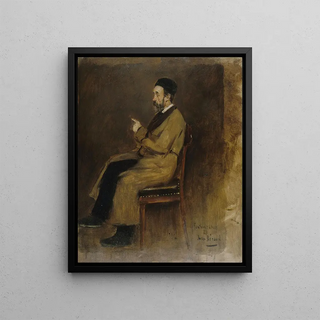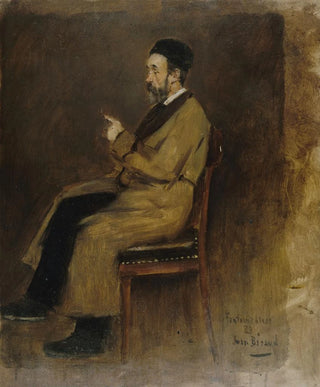Art print | Portrait of Jean-Jacques Weiss 1827-1891 editor at the Journal des débats - Jean Béraud


View from behind

Frame (optional)
The "Art print of Jean-Jacques Weiss 1827-1891, editor at the Journal des débats" by Jean Béraud is a piece that transcends the simple frame of painting to become a true testament to its era. This portrait, imbued with finesse and psychological depth, offers a fascinating glimpse into the intellectual and political life of 19th-century France. Jean-Jacques Weiss, an emblematic figure of journalism of his time, is captured here in a moment of introspection, revealing not only his character but also the richness of his engagement in the debates that animated society at the time. Through this work, Béraud invites us to explore the nuances of Weiss's personality while immersing us in a rich and complex historical context.
Style and uniqueness of the work
Jean Béraud's work stands out for its realistic approach, skillfully blending meticulous observation of details with an intimate atmosphere. In this portrait, the features of Jean-Jacques Weiss are rendered with remarkable precision, each shadow and light contributing to a striking depth. The color palette chosen by the artist, both soft and contrasted, helps express the emotions of the subject. Weiss's gaze, both thoughtful and engaging, challenges us and invites reflection on his thoughts and ideas. This ability to capture the human soul is one of Béraud's hallmarks, who manages to establish a strong emotional connection between the viewer and the subject. The background setting, subtly suggested, evokes the intellectual environment in which Weiss evolves, adding an extra dimension to this already meaningful work.
The artist and his influence
Jean Béraud, born in 1849, is one of the most emblematic painters of the late 19th century. His work, often focused on Parisian life, bears witness to a period of social and artistic upheavals. Influenced by the Impressionist movement, Béraud developed a style that is uniquely his own, combining realism and sensitivity. His portraits, like that of Jean-Jacques Weiss, reveal...

Matte finish

View from behind

Frame (optional)
The "Art print of Jean-Jacques Weiss 1827-1891, editor at the Journal des débats" by Jean Béraud is a piece that transcends the simple frame of painting to become a true testament to its era. This portrait, imbued with finesse and psychological depth, offers a fascinating glimpse into the intellectual and political life of 19th-century France. Jean-Jacques Weiss, an emblematic figure of journalism of his time, is captured here in a moment of introspection, revealing not only his character but also the richness of his engagement in the debates that animated society at the time. Through this work, Béraud invites us to explore the nuances of Weiss's personality while immersing us in a rich and complex historical context.
Style and uniqueness of the work
Jean Béraud's work stands out for its realistic approach, skillfully blending meticulous observation of details with an intimate atmosphere. In this portrait, the features of Jean-Jacques Weiss are rendered with remarkable precision, each shadow and light contributing to a striking depth. The color palette chosen by the artist, both soft and contrasted, helps express the emotions of the subject. Weiss's gaze, both thoughtful and engaging, challenges us and invites reflection on his thoughts and ideas. This ability to capture the human soul is one of Béraud's hallmarks, who manages to establish a strong emotional connection between the viewer and the subject. The background setting, subtly suggested, evokes the intellectual environment in which Weiss evolves, adding an extra dimension to this already meaningful work.
The artist and his influence
Jean Béraud, born in 1849, is one of the most emblematic painters of the late 19th century. His work, often focused on Parisian life, bears witness to a period of social and artistic upheavals. Influenced by the Impressionist movement, Béraud developed a style that is uniquely his own, combining realism and sensitivity. His portraits, like that of Jean-Jacques Weiss, reveal...






